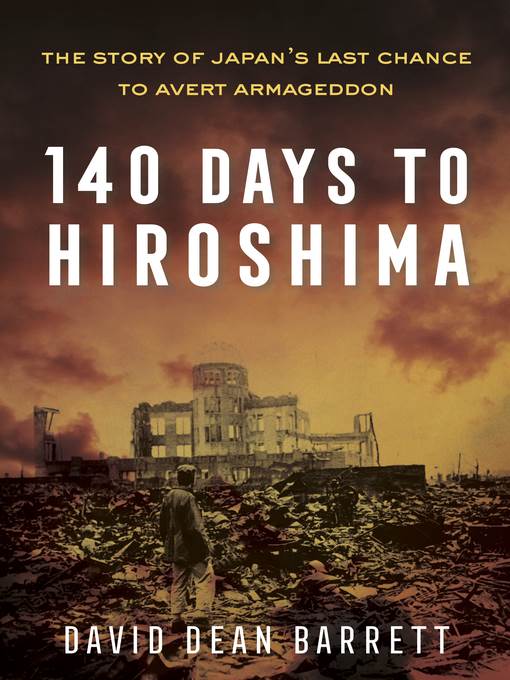
140 Days to Hiroshima
The Story of Japan's Last Chance to Avert Armageddon
فرمت کتاب
ebook
تاریخ انتشار
2020
نویسنده
David Dean Barrettناشر
Diversion Booksشابک
9781635765809
کتاب های مرتبط
- اطلاعات
- نقد و بررسی
- دیدگاه کاربران
نقد و بررسی

February 15, 2020
A detailed, almost day-by-day account of political debates that preceded Japan's surrender in World War II. In his first book, Colorado-based military historian Barrett emphasizes that by 1943, once it became clear that matters were going badly, Japanese leaders never doubted that they could salvage matters by convincing the United States that every Japanese would fight to the death. They believed the U.S. lacked the fortitude for this crushing task and would seek a compromise peace. As the war journal of Imperial Headquarters wrote in July 1944, "the only course left is for Japan's...people to sacrifice their lives by charging the enemy to make them lose their will to fight." By that time, American military leaders also suspected that to win, American forces would be forced to kill every single enemy. The result was massive firebombing of cities and use of the atomic bomb. Barrett reminds readers that at first, the atomic bomb played no part in America's strategy because no one knew if it would work. Planners envisioned a massive invasion of the home islands for November 1945. Everything changed after the bomb's successful test on July 16. Several important American figures objected to such a terrible weapon, but they did not make a big fuss, and Barrett expresses little sympathy. According to the author, there was never doubt that we would use it. The Aug. 6 bombing of Hiroshima shocked Japan's leaders, strengthened "peace" advocates, and persuaded the emperor that the war might be lost, but military chiefs exercised their veto, convinced that America would invade and suffer a crushing defeat. The Soviet Union's declaration of war on Aug. 8 did not tip the balance, but the Nagasaki bomb on Aug. 9 was another matter. Military leaders realized that the invasion they yearned for might not happen and that the U.S. might simply continue to drop atom bombs. As a result, when the emperor announced that he favored surrender, they went along. A nonrevisionist, reflective, opinionated, intensely researched WWII history.
COPYRIGHT(2020) Kirkus Reviews, ALL RIGHTS RESERVED.

February 14, 2020
Several books have been written about the bombing of Hiroshima and Nagasaki at the end of World War II, but, here, military historian Barrett offers a unique glimpse at the political negotiations between the United States and Japan in the weeks leading up to and directly after the bombings. Focusing on the politicians themselves, as well as the generals who were leading the fight in both Japan and America, the text presents a nearly day-by-day look at the negotiations. The Japanese generals on the "committee of six" were determined to continue the war, even after the bombs were dropped. The American generals advocated an invasion of the Japanese homeland, while American politicians focused on the projected Allied causalities and attempted to find a way to avoid invading Japan. The text is straightforward, though abrupt shifts in points of view are occasionally confusing. VERDICT This look at the negotiations surrounding the bombing of Hiroshima and Nagasaki is appropriate for any beginning World War II scholar.--Danielle Williams, Univ. of Evansville
Copyright 2020 Library Journal, LLC Used with permission.

February 17, 2020
Historian Barrett debuts with an impressively researched chronicle of the months leading up to the atomic bombing of Hiroshima. Alternating between Japanese and American perspectives, Barrett opens with the firebombing of Tokyo on Mar. 10, 1945, noting that the estimated death toll of 84,000 people was greater than that of “any aerial assault in any theater during World War II.” Despite the level of destruction, Japanese military and civilian leaders remained unconvinced the war was lost. Barrett credits this intransigence to the Japanese army’s allegiance to the concept of “death before dishonor,” and to America’s objective of forcing Japan’s unconditional surrender. As President Truman and U.S. military commanders estimated the cost of invading the Japanese mainland, Japanese officials issued directives for soldiers and civilians to carry out suicide attacks with “hand-carried mines and explosives.” Nine days after the Hiroshima bombing (and six days after Nagasaki), a cadre of Japanese officers launched a failed coup d’état to prevent the emperor from surrendering. In the book’s epilogue, Barrett weighs arguments against Truman’s decision to drop the bomb and finds them lacking. By capturing both sides of the conflict, Barrett generates drama despite the inevitability of the book’s conclusion. Military history buffs will be riveted. Agent: Leticia Gomez, Savvy Literary Services.

























دیدگاه کاربران